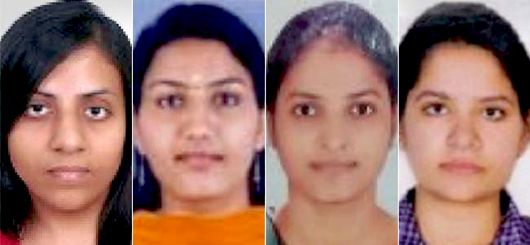New Delhi, Jul 4: The Union Public Services Commission, or UPSC has announced the results of the civil services exam for this year. Four of the five toppers are women.The top three candidates are Ira Singhal, Renu Raj and Nidhi Gupta.

Ms Singhal and Ms Gupta are Indian Revenue Service officials from Delhi. Ms Raj is a doctor from Kerala.
"I am really very happy. I can't believe this. I just prepared for the examination," said Ms Singhal, who is differently abled, but topped the exam in the general category.
"I want to be an IAS officer. I want to do something for the benefit of physically-handicapped people," news agency Press Trust of India quoted her as saying.
Dr Raj, who works in a hospital in Kollam and took the exam for the first time, said, "I am extremely happy to know the results. I have been preparing for the exam for the last one year."
Third Rank holder Ms Gupta, who is the Assistant Commissioner of Customs and Central Excise, said it was a proud moment for her. " I put in lot of hard work and it paid off," she said.
This was the first time the Commission declared the final results within four days of the closing date for the personality tests or interviews, a senior official said.
The civil services preliminary examination was conducted on August 24 last year at 2,137 venues in 59 centres across the country. About 9.45 lakh candidates had applied for it but approximately 4.51 lakh appeared for the examination.
Altogether, 1,364 posts are to be filled through the examination.





Comments
Add new comment